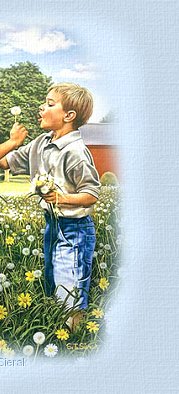|
 
  
By
the Rev. Lee Woofenden
Bridgewater, Massachusetts, April 22, 2001

  
Psalm
131 My heart is not proud
My
heart is not proud, O Lord,
my eyes are not
haughty;
I do not concern myself with great matters
or things too
wonderful for me.
But I have stilled and quieted my soul;
like a weaned
child with its mother,
like a weaned
child is my soul within me.
O Israel, put your hope in the Lord
both now and
forevermore.

Mark 10:13-16 Little children and Jesus
People
were bringing little children to Jesus to have
him touch them, but the disciples scolded them.
When Jesus saw this, he was indignant. He said
to them, "Let the little children come to
me, and do not hinder them, for the kingdom of
God belongs to such as these. I tell you the
truth, anyone who will not receive the kingdom
of God like a little child will never enter
it." And he took the children in his arms,
put his hands on them, and blessed them.

Heaven and Hell #278 Living in innocence
When
we are in a state of innocence, we do not take
credit for anything good, but ascribe and
attribute everything to the Lord. We want to be
led by the Lord and not by ourselves. We love
everything that is good, and delight in
everything that is true because we know and
perceive that loving what is good--which means
intending and doing good--is loving the Lord,
and loving what is true is loving our neighbor.
Further,
we live content with what we have, whether it is
little or much, because we know that we receive
as much as is useful--little if little is good
for us, and much if much is good for us. We do
not know what is best for ourselves; only the
Lord knows. And in the Lord's sight, everything
given is eternal.
  
Let
the little children come to me, and do not
hinder them, for the kingdom of God belongs to
such as these. I tell you the truth, anyone who
will not receive the kingdom of God like a
little child will never enter it. (Mark 10:14,
15)
This
year, I'm getting a jump on children's Sunday
and giving you a sermon on children a bit early.
But it's not really about children. It's about
us. In the Gospel story, the children had no
problems at all. They were coming to Jesus along
with their parents, happy to be in his presence
and feel his love. It was the adults--actually,
Jesus' own disciples--who were having a problem.
We
don't know exactly what was going through their
minds when they began to turn away the parents
who were bringing their children to Jesus.
Perhaps they thought Jesus was much too
important a man to "waste" his time
with mere children. After all, in those days
children were mainly valued as future adults who
would provide labor in the family business and
carry on the family name. Until then, they were
a drain on the family resources. In modern day
financial language, we might say that children
were often seen as an investment in the future,
not a current asset.
Perhaps
the disciples thought that Jesus' time was
better spent teaching adults, who could
understand what he was saying, and have their
lives changed by it. Time spent with children
was time not spent with adults who might accept
the message. Or perhaps they were simply acting
the part of a celebrity's "handlers,"
trying to keep him from being swamped and
exhausted by the people.
Whatever
their reasons, Jesus was not at all happy when
he realized that his disciples were preventing
parents from bringing their children to him.
This is when he said those famous words--not to
the parents, but to the disciples: "Anyone
who will not receive the kingdom of God like a
little child will never enter it." And
then, we are told, "he took the children in
his arms, put his hands on them, and blessed
them."
In
the context of his culture, taking the children
in his arms and blessing them was not so
surprising. It was a custom in those days for
mothers to bring their children to a Rabbi on
their first birthday so that he would bless
them. The more distinguished the Rabbi, the
better it was. So these mothers were giving
Jesus a compliment by bringing their children to
him. And in blessing them, he was accepting the
role of a Rabbi--a spiritual leader.
What
was surprising was the high honor he gave
the children by his words. "The kingdom of
God belongs to people like these," he said,
and continued on to tell the adults that they
must also become like little children in order
to enter heaven. Of course, this has led to a
lot of discussion over the centuries as to just
what he meant. One popular Christian commentary
offers four qualities of children that adults
may need in order to enter heaven:
- Children
have not lost their sense of wonder
as adults so often have.
- Children's
lives are founded on trust that their
needs will be met.
- Children
are naturally obedient, even though
they do rebel and disobey, too.
- Children
are very forgiving, and soon forget
and move past all sorts of wrongs done to
them.
I
would suggest that all four of these
qualities--a sense of wonder, trust, obedience,
and forgiveness--could be brought under one
quality that Emanuel Swedenborg offers as the
primary characteristic of children, and
especially of young children: innocence.
Even
though children are most often entirely wrapped
up in their own feelings and desires in a way
that would be considered, well, childish
in an adult, we can't help but love them. Why?
Because they mean no harm by anything they do.
They innocently and spontaneously express what
is within, and the quality of simple trust and
harmlessness that suffuses everything they say
and do gives them an endearing quality that few
of us manage to retain into adulthood. As
children grow, their early innocence rapidly
fades, and though there are still vestiges of it
even into the teenage years, parents must find
another basis on which to love their older
children.
The
innocence of childhood is extraordinarily
difficult to recapture as an adult. In fact,
let's be honest: as long as we live on this
earth and our minds remain fully functioning, we
can never again experience the utter innocence
of young children whose parents love and care
for them. We have seen too much, and we know too
much. We have seen too much of the seamy side of
life--of people treating each other badly and not
being trustworthy; of people taking advantage of
others and doing great damage to them. We know
too much of what can happen to people in this
world who do not protect themselves from that
seamy side of life. We may have had our own
innocence taken advantage of; or we may have
seen others "taken to the cleaners,"
so to speak, when they really didn't deserve it.
Besides,
as adults, we normally do not have parents
taking care of all our physical needs--not to
mention our emotional needs. As children, unless
we had neglectful or abusive parents, or some
other social or family situation that caused us
not to be taken care of properly, we simply assumed
that there would be food on the table, clothes
on our bodies, and a roof over our heads. These
were givens. And even if we were neglected, what
sustenance we did get generally came from
others, and not from our own efforts--especially
when we were very young.
For
adults, these things aren't true anymore. It can
be a rude awakening when our schooling is
finished and we realize that if we don't get a
job and make some money, we won't have a place
to stay, food to eat, or clothes to wear. Going
back to our parents' place is an option, but it
is generally at the cost of not being able to
feel like full, independent adults.
What
we look for as young adults is not innocence--not
trusting others to provide for our wants and
needs and make decisions for us--but independence:
the ability to take care of ourselves and decide
for ourselves what we will do from minute to
minute, day to day, week to week, and year to
year. As older children, teenagers, and young
adults, we work hard at being able to take care
of ourselves and run our own lives. And we have
no intention of going back to being dependent on
someone else.
Perhaps
this is why we have a whole lifetime to become
childlike again. Perhaps this is why it is only
in our elder years, when we either no longer
need to work to support ourselves and our
families or are no longer able to work,
that we can enter our "second
childhood." Perhaps it takes us a whole
adult life full of being self-sufficient in
order to realize that we humans are not meant
to be self-sufficient.
When
we come to that realization, we begin once again
to acquire in ourselves the quality of innocence
that has been largely missing from our lives
ever since early childhood. It is often in our
final years on this earth that we once again
develop a sense of wonder, trust, obedience (to
whom?), forgiveness, and the other qualities of
innocence.
In
its more common definitions, innocence involves
two qualities. One is harmlessness: the
inability or unwillingness to hurt or do evil to
anyone or anything. And if we are unable or
unwilling to do harm, then except when we make a
mistake or lack proper understanding of a
situation, we in fact do no harm to
anyone or anything. This is the kind of
innocence that the courts deal with, and it is
in contrast to guilt, which involves a
willingness and even a desire to harm another
person, which is carried out in action when
there is an opportunity to do so.
The
other quality associated with innocence, though
it is not as often clearly identified, is a willingness
to be led by others rather than insisting on
following our own judgment. In our culture,
which does not put a high value on this aspect
of innocence, it is often labeled inexperience
or naiveté. Only emotional weaklings and people
who don't know better would allow themselves to
be led around by others like sheep. Yes, that is
okay for little children, but mature adults
should run their own lives, and not be at
someone else's beck and call!
So
how can a self-respecting adult in our society
ever heed Jesus' words and become like a child
again, after putting out years and years of
effort to become a self-responsible,
self-directing adult? It flies in the face of
all our instincts.
And
that is exactly the problem. After childhood,
our instincts are all in the direction of
becoming the master of our own fate, the ruler
of our own lives. Dependence on others for any
of our basic needs makes us vulnerable--and our
instincts tell us that we should be strong and
self-reliant, not trusting anything important to
someone other than ourselves. After all, if we
trust someone else to take care of one of our
fundamental needs, what if they don't follow
through? It's better to take care of it
ourselves, and be sure that it will get done.
Unfortunately,
if we stick to those instincts, we find
ourselves becoming more and more isolated from
everyone around us. If we are not able to open
up in trust to others, but keep all our most
sensitive wants and needs to ourselves, our
world becomes smaller and smaller, until even
those we should feel the closest to--our best
friends and closest family members--begin to
feel emotionally distant. The price for
self-sufficiency is a lack of relationship. And
we humans, for all our instincts toward
self-reliance, have an even deeper need: the
need for relationship and community with other
human beings.
It
is this need that gradually brings us around,
and causes us to move back toward the innocence
of children. Children live in a web of
relationships that are essential to their
physical and emotional wellbeing. Separated from
parents and family, and later from friends and
mentors, they soon wither and die emotionally
and even physically.
Even
as adults, it is a fiction that we are in any
way self-sufficient. We work for other people
and are paid and supported by other people in a
vast economic web so complex that thousands of
economists can spend their lifetimes studying
it, and still not fully understand it. And the
emotional web of relationships that we live in
is an order of magnitude more complex, so that
psychologists and psychiatrists admit that we
only understand a tiny fraction of what there is
to know about the human mind, and even less
about what goes on when human beings relate to
each other, either one-on-one or as part of a
group.
In
truth, we are always dependent on others
even for our most basic daily needs. But we
spend a certain part of our adulthood with the
rather illogical feeling that we are
"supporting ourselves." Perhaps it is
a necessary illusion. Perhaps we would not get
up each morning and make our contribution to
society if we didn't think that we were
supporting ourselves by our efforts. And God has
constructed this world so that one way or
another, we can find the motivation we need to
get out of ourselves and be of service to our
fellow human beings.
For
most of us, it takes a lifetime of
"supporting ourselves" before we begin
to look beneath the surface and realize that all
along, we have been supported by more people
than we ever realized. We come to realize just how
much we depend upon others only when we look
back on those times in our lives when we were
reaching the end of our rope, and then someone
stepped in to keep us from falling; or when we
simply weren't strong enough on our own, and the
help that we needed was there for us.
This
is when we can begin once again to have the
innocence of a child. Only now, that innocence
has a new quality that children have not yet had
time to develop. The innocence of children is
not an intentional innocence. Children are
innocent because they don't know any better and
do not have enough strength or experience to do
any real harm. The innocence we develop later in
life is not from inexperience or naiveté, but
from wisdom.
It
is the wisdom of knowing that on our own, we are
incomplete human beings. It is the innocence of
knowing the difference between right and wrong,
between good and evil, and consciously choosing
what is good and right because we believe that
is the best way to follow. And especially, it is
the innocence of being willing to relinquish
control over our own lives--not to any other
human being or any human institution, but to
God.
We
can never go back to the same kind of innocence
we had as children, nor would we want to. But we
can move forward to the true innocence of
a complete trust in the goodness and love of
God, and a full and joyous desire do spend our
lives doing only what is good and right in order
to bring peace and happiness to our fellow human
beings.
And
yes, we do become children once again: we become
children of God. Amen.

 

To Topic Index


"Make
a Wish" - painted for the Make A Wish
Foundation
©Tom
Sierak and used with his permission
by
Moon And Back Graphics to construct
this set

Music: Secret
Kisses
© Bruce DeBoer

|

Floating
Script Courtesy of:

|
|